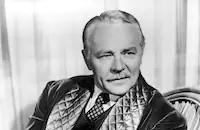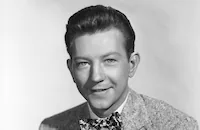Night Work
Cast & Crew
George Archainbaud
Mary Boland
Charles Ruggles
Billy Lee
Donald O'connor
Clem Bevans
Film Details
Technical Specs

Synopsis
Soft-spoken Homer C. Fitch works his first day as manager of the Windsor Arms, a posh apartment building, and that night shares his problems with his wife Sybil, their daughter Patricia, adopted son Joe and Butch Smiley, an orphan whom they want to adopt. They also discuss Butch's future, for although Homer has written to Butch's grandfather concerning the adoption, they have received no response. Later in the evening, police officer Flannigan brings in Butch, whom he caught trying to run away. Butch reveals that he was having difficulty with his homework and did not want to disgrace the family with his poor schoolwork. Although Homer is so meek that he cannot stand up to bullies like Mr. Turk, the building's rude engineer, he is a good father, and so he, Sybil and Flannigan help Butch with his homework. While they are acting out the math problems, Butch's grandfather, Smokestack Smiley, arrives. Smokestack is an old-fashioned steeplejack who believes that a man must be aggressive and tough in order to be a real man, and he insists on staying with the family for a few days to determine if they are good enough to adopt Smiley. The next day, Smokestack realizes that Homer does not fulfill his idea of masculinity, despite Sybil's claim that he was nicknamed "Bulldog" in high school because of his ferocious behavior. Smokestack's poor opinion of Homer worsens upon learning that he is afraid of heights, and so Sybil advises Homer to act more aggressively. The next morning, Homer pays Turk to let him hit him in front of the family, and the contented Smokestack then takes Butch and Joe to the roof to show them his steeplejack rigging. While they are gone, a newly arrived tenant reveals himself to be Bruiser Brown, the bully who tormented Homer in high school. Homer, Sybil and Patricia are forced to have dinner with Bruiser that night, and after they distract Smokestack with a lie about going out with Homer's boss, they go to Bruiser's apartment. There, Bruiser spikes Homer's lemonade with gin, and the teetotaling Homer makes a fool of himself when Smokestack appears after finding out where the Fitches really are from Patricia's fiancé, Windy Wilson. Smokestack discovers from Bruiser that Homer's real nickname was "Wishy Washy," and despite Homer and Sybil's pleas, Smokestack decides to take Butch to California. The next day, Butch sorrowfully prepares to leave. A crisis occurs, however, when little Joe climbs into Smokestack's rig and is suspended helplessly from the roof. With no regard for his own safety, Homer climbs out on a ladder to save his son. Homer almost plummets to the ground after rescuing Joe but is saved by Smiley and Windy. Bruiser appears and calls Homer "Wishy Washy," after which Smokestack proclaims that he will be proud to have the Fitches adopt Butch, and that from now on Homer is to be called "Bulldog."

Director
George Archainbaud
Cast

Mary Boland

Charles Ruggles
Billy Lee

Donald O'connor

Clem Bevans

William Frawley
Joyce Mathews
John Hartley
William Haade
Edward Gargan
Alec Craig
George Mendoza
Georgia Simmons
Sam Ash
Crew
Franz Bachelin
Monte Brice
Lloyd Corrigan
Hans Dreier
George Dutton
Farciot Edouart
Lewis R. Foster
A. E. Freudeman
Stuart Gilmore
Harry Hallenberger
George Hippard
Louis S. Kaye
William Lebaron
Glenn Rominger
William H. Wright

Film Details
Technical Specs

Articles
Donald O'Connor, 1925-2003
Born Donald David Dixon O' Connor in Chicago on August 28, 1925, he was raised in an atmosphere of show business. His parents were circus trapeze artists and later vaudeville entertainers, and as soon as young Donald was old enough to walk, he was performing in a variety of dance and stunt routines all across the country. Discovered by a film scout at age 11, he made his film debut with two of his brothers in Melody for Two (1937), and was singled out for a contract by Paramount Pictures. He co-starred with Bing Crosby and Fred MacMurray in Sing, You Sinners (1938) and played juvenile roles in several films, including Huckleberry Finn in Tom Sawyer - Detective (1938) and the title character as a child in Beau Geste (1939).
As O'Connor grew into adolescence, he fared pretty well as a youthful hoofer, dancing up a storm in a string of low-budget, but engaging musicals for Universal Studios (often teamed with the equally vigorous Peggy Ryan) during World War II. Titles like What's Cookin', Get Hep to Love (both 1942), Chip Off the Old Block and Strictly in the Groove (both 1943) made for some fairly innocuous entertainment, but they went a long way in displaying O'Connor's athletic dancing and boyish charm. As an adult, O'Connor struck paydirt again when he starred opposite a talking mule (with a voice supplied by Chill Wills) in the enormously popular Francis (1949). The story about an Army private who discovers that only he can communicate with a talking army mule, proved to be a very profitable hit with kids, and Universal went on to star him in several sequels.
Yet if O'Connor had to stake his claim to cinematic greatness, it would unquestionably be his daringly acrobatic, brazenly funny turn as Cosmo Brown, Gene Kelly's sidekick in the brilliant Singin' in the Rain (1952). Although his self-choreographed routine of "Make "Em Laugh" (which includes a mind-bending series of backflips off the walls) is often singled out as the highlight, in truth, his whole performance is one of the highlights of the film. His deft comic delivery of one-liners, crazy facial expressions (just watch him lampoon the diction teacher in the glorious "Moses Supposes" bit) and exhilarating dance moves (the opening "Fit As a Fiddle" number with Kelly to name just one) throughout the film are just sheer film treats in any critic's book.
After the success of Singin' in the Rain, O'Connor proved that he had enough charisma to command his first starring vehicle, opposite Debbie Reynolds, in the cute musical I Love Melvin (1953). He also found good parts in Call Me Madam (1953), There's No Business Like Show Business (1954), and Anything Goes (1956). Unfortunately, his one attempt at a strong dramatic role, the lead in the weak biopic The Buster Keaton Story (1957) proved to be misstep, and he was panned by the critics.
By the '60s, the popularity of musicals had faded, and O'Connor spent the next several years supporting himself with many dinner theater and nightclub appearances; but just when it looked like we wouldn't see O'Connor's talent shine again on the small or big screen, he found himself in demand at the dawn of the '90s in a string of TV appearances: Murder She Wrote, Tales From the Crypt, Fraser, The Nanny; and movies: Robin Williams' toy-manufacturer father in Toys (1992), a fellow passenger in the Lemmon-Matthau comedy, Out to Sea (1997), that were as welcoming as they were heartening. Survivors include his wife, Gloria; four children, Alicia, Donna, Fred and Kevin; and four grandchildren.
by Michael T. Toole

Donald O'Connor, 1925-2003
Quotes
Trivia
Notes
The working title of this film was Homework. It was a sequel to the 1939 Paramount film Boy Trouble, which also featured the Fitch family.














